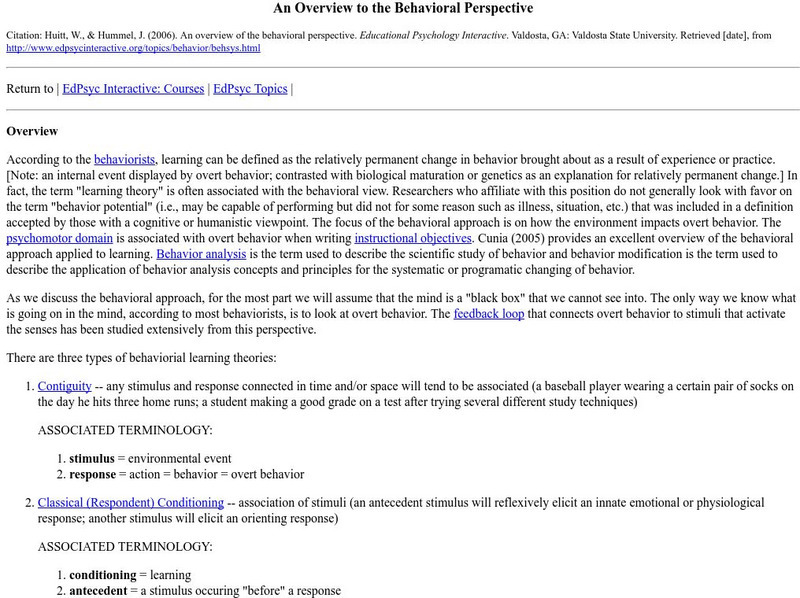Curated OER
Behaviorism, the Modern Note in Psychology
"Behaviorism--The modern Note in Psychology" written by John B. Watson in 1925 was an important paper in the development of Behaviorism in Psychology. It is reproduced in full here.
Curated OER
Behaviorism, the Modern Note in Psychology
"Behaviorism--The modern Note in Psychology" written by John B. Watson in 1925 was an important paper in the development of Behaviorism in Psychology. It is reproduced in full here.
Curated OER
Behaviorism, the Modern Note in Psychology
"Behaviorism--The modern Note in Psychology" written by John B. Watson in 1925 was an important paper in the development of Behaviorism in Psychology. It is reproduced in full here.
Curated OER
Behaviorism, the Modern Note in Psychology
"Behaviorism--The modern Note in Psychology" written by John B. Watson in 1925 was an important paper in the development of Behaviorism in Psychology. It is reproduced in full here.
Other
Psychology World: Cognitive Dissonance
An explanation of the three fundamental assumptions of the cognitive dissonance theory. Also presents an experiment that was conducted as an example that shows how the theory works.
Other
Other Voices: The Psychology of Uncertainty: Rudolph Fisher's "The Conjure Man D
An analysis by Adrienne Gosselin taken from an online Journal of Rudolph Fisher's "The Conjure-Man Dies." With endnotes and bibliographical references.
Other
Illinois State University: Carl Rogers Links
A site that offers a biography, essay, and in depth summary of Carl Rogers, humanistic therapist.
Other
Cyber Parent: How to Grow Self Esteem in Your Child
Site offers information on several aspects of self-esteem. Talks about discipline, positive language to use, and offering choices to children. Includes response to questions from parents.
Other
Massey University: Beyond the Individual Social Antimony
This is a paper discussing Piaget and Vygotsky. It compares their similarities and differences. There is a large section on social origins of development.
TED Talks
Ted: Ted Ed: Why Is Yawning Contagious?
*Yaaawwwwwn* Did just reading the word make you feel like yawning yourself? Known as contagious yawning, the reasons behind this phenomenon have been attributed to both the physiological and psychological. It's been observed in children...
Science Buddies
Science Buddies: The Brains Behind 'Where's Waldo?'
What makes you notice someone in a crowd? Why do some things stand out, while others melt into the background? In this experiment you can investigate the psychology of how things get noticed, by studying how our brains perform a visual...
University of Glasgow
University of Glasgow: Critical Reviews
This site is designed to be used by psychology students at the university level, but it provides helpful instruction for anyone writing critical reviews of non-fiction. Instruction includes everything from how to be critical to...
Rice University
Hyper Stat Online Statistics Textbook
Many people cringe at the idea of studying statistics, but it doesn't have to be impossible! David M. Lane, Associate Professor of Psychology, Statistics, and Management at Rice University, offers a large collection of resources for the...
Other
Valdosta State: The Behavioral System
Excellent review of behavioral psychology. Presents the four types of behavioral theories in outline form. Has links to more details.
Other
Presents From the Dead: Analysis of Haruki's Works
The author of this critical review analyzes the role of the narrator, "I," in Haruki's novels, discussing whether the "I" psychologically plays a mother or father role. This site is a translation of the original critique.
Other
Vantage Quest: Comparative View of Creative Theories
An article comparing creativity theories of psychoanalytic, behavioristic, and humanistic psychology.
Other
Color Matters
Students learn to understand color from a variety of perspectives: physiology, psychology, philosophy, and art.
Other
Great Ideas in Personality: Behaviorism
Chart detailing Behaviorism as a school of thought in Psychology. Organized into three sections: Behaviorist Arguments, Criticisms of Behaviorist Arguments, and Behaviorist Responses to Criticisms.
National Science Foundation
National Science Foundation: Language and Linguistics
The language we use everyday reveals a great deal about who we are and where we come from. However, did you know that language is linked to psychology, biology, and other sciences? Explore the "science" of language: how the brain...
TeachEngineering
Teach Engineering: The Big Mo
Momentum is not only a physical principle; it is a psychological phenomenon. Students learn how the "Big Mo" of the bandwagon effect contributes to the development of fads and manias, and how modern technology and mass media accelerate...
TeachEngineering
Teach Engineering: Team Up!
Students explore the physical and psychological effect of stress and tension on human beings. They develop their observing, thinking, writing and teamwork skills by working on a group art project and reporting about it. They learn about...
TeachEngineering
Teach Engineering: Stress, Inc.
Students explore the physical and psychological effect of stress and tension on human beings. Concepts of stress and stress management are introduced. Students discover how perception serves to fuel a huge industry dedicated to...
Bryn Mawr College
Serendip: Mind and Body: Rene Descartes to William James
Traces the history of Rene Descartes and William James. Gives information on the rise of psychology. Spanish translation available.
Blackdog Media
Classic Reader: The Gambler by Fyodor Dostoevsky
This is the full text of the novel The Gambler by Fyodor Dostoevsky. This stunning psychological portrait tells the story of Alexey Ivanovitch, a young tutor working in the household of an imperious Russian general. Alexey tries to break...
Other popular searches
- School Psychology
- +School Psychology
- Experimental Psychology
- Developmental Psychology
- Abnormal Psychology
- Social Psychology
- Personality Psychology
- Psychology Lesson Plans
- High School Psychology
- Adult Psychology
- Psychology Research Methods
- Analytical Psychology





















